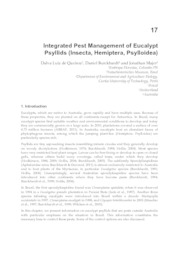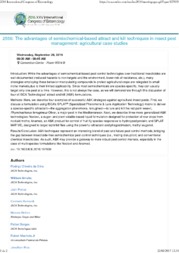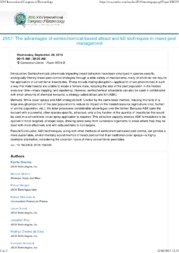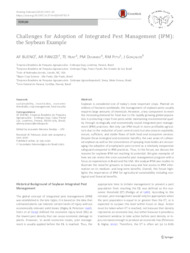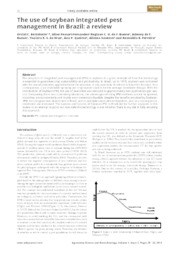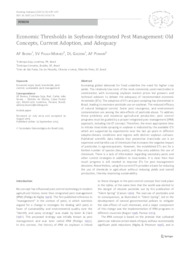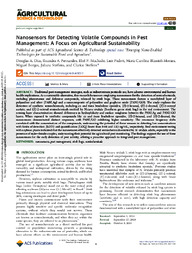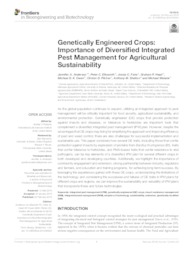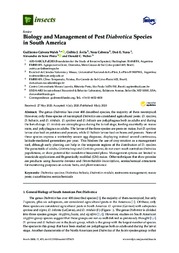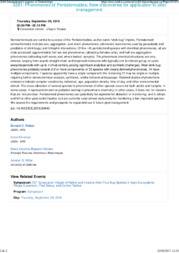Busca de Publicações
Filtrar por:
| |
| Autoria: SILVA, R. O. DA; URRUTIA, W.; PONCE, J.; BERNARDI, C.; BOTTON, M.; BORGES, R.; MACHOTA JR, R.; RICO, J.; SAROLI, J.; SHARMA, K.; MAFRA, L. E. J.; MAFRA-NETO, A. Introduction: While the advantages of semiochemical-based pest control technologies over traditional insecticides are well-documented (reduced hazards to non-targets and the environment, lower risk of... ... |
| Autoria: SHARMA, K.; BOTTON, M.; BORGES, R.; MACHOTA JR, R.; SAROLI, J.; RICO, J.; SILVA, R. O. da; BERNARDI, C.; URRUTIA, W.; MAFRA, L. E. J.; MAFRA-NETO, A. Introduction: Semiochemicals (chemicals impacting insect behavior) have been employed in species-specific, ecologically friendly insect pest control strategies through a wide variety of mechanisms, ma... ... |
| Autoria: BUENO, A. de F.; PANIZZI, A. R.; HUNT, T. E.; DOURADO, P. M.; PITTA, R. M.; GONÇALVES, J. Soybean is considered one of today?s most important crops. Planted on millions of hectares worldwide, the management of soybean pests usually requires large amounts of chemicals. However, a key compon... ... |
| Autoria: BORTOLOTTO, O. C.; POMARI-FERNANDES, A.; BUENO, R. C. O. de F.; BUENO, A. de F.; KRUZ, Y. K. S. da; QUEIROZ, A. P.; SANZOVO, A.; FERREIRA, R. B. The adoption of integrated pest management (IPM) in soybean is a great example of how this technology is essential to guarantee crop sustainability and productivity. In Brazil, up to 1970, soybean was... ... |
| Autoria: BUENO, A. F.; PAULA-MORAES, S. V.; GAZZONI, D. L.; POMARI, A. F. Increasing global demands for food underline the need for higher crop yields. The relatively low costs of the most commonly used insecticides in combination with increasing soybean market prices led g... ... |
| Autoria: DIAS, D. A.; FERNANDES, I. A.; MACHADO, E. P.; PEDOTT, L.; MORAES, M. C. B.; BORGES, M.; STEFFENS, J.; STEFFENS, C. Traditional pest management strategies, such as indiscriminate pesticide use, have adverse environmental and human health implications. As a sustainable alternative, this research focuses on employing... ... |
| Autoria: ANDERSON, J. A.; ELLSWORTH, P. C.; FARIA, J. C.; HEAD, G. P.; OWEN, M. D. K.; PILCHER, C. D.; SHELTON, A. M.; MEISSLE, M. As the global population continues to expand, utilizing an integrated approach to pest management will be critically important for food security, agricultural sustainability, and environmental protect... ... |
| Autoria: CABRERA WALSH, G.; AVILA, C. J.; CABRERA, N.; NAVA, D. E.; PINTO, A. de S.; WEBER, D. C. The genus Diabrotica has over 400 described species, the majority of them neotropical. However, only three species of neotropical Diabrotica are considered agricultural pests: D. speciosa, D. balteata... ... |
| Autoria: WEBER, D. C.; KHRIMIAN, A.; BLASSIOLI-MORAES, M. C.; MILLAR, J. G.
|
Observações
1 - Por padrão são exibidas publicações dos últimos 20 anos. Para encontrar publicações mais antigas, configure o filtro ano de publicação, colocando o ano a partir do qual você deseja encontrar publicações. O filtro está na coluna da esquerda na busca acima.
2 - Para ler algumas publicações da Embrapa (apenas as que estão em formato ePub), é necessário ter, no celular ou computador, um desses softwares gratuitos. Sistemas Android: Google Play Livros; IOS: iBooks; Windows e Linux: software Calibre.
Acesse outras publicações
Acesse a Base de Dados da Pesquisa Agropecuária (BDPA) para consultar o acervo completo das bibliotecas da Embrapa.

